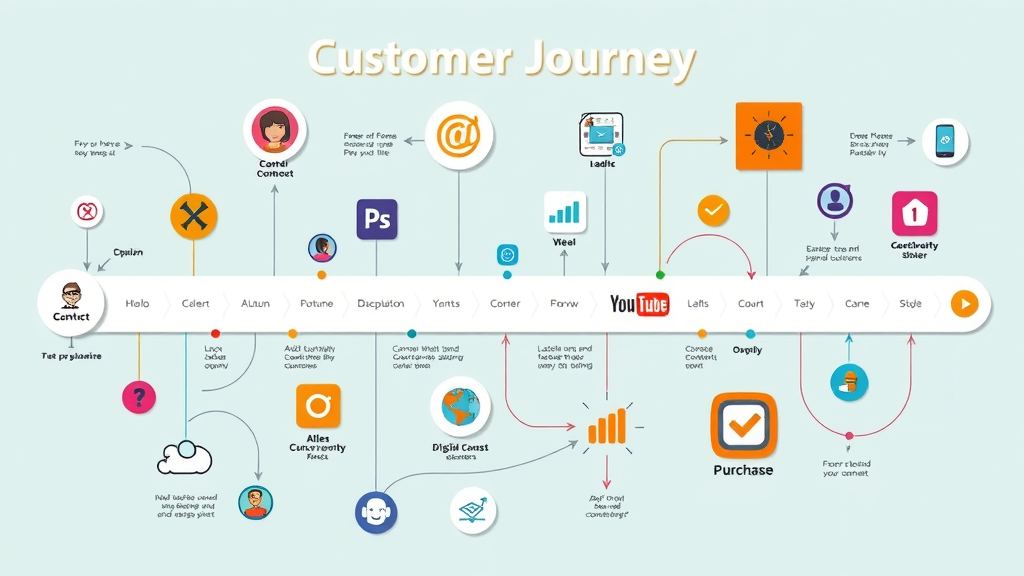Did you know that businesses leveraging marketing automation tools see up to a 14.5% increase in sales productivity , while saving over 6 hours per week on repetitive tasks? Automated marketing tools are no longer a luxury; they're the secret behind high-performing, efficient marketing teams everywhere. If you’re ready to spend less time on tedious tasks and more time growing your business, you’re in the right place. Discover the top solutions and expert strategies to revolutionize your marketing process—without losing your personal touch.
Unlocking Time-Saving Success: Why Automated Marketing Tools Are Reshaping Modern Marketing
"Businesses leveraging marketing automation tools see up to a 14.5% increase in sales productivity, while saving over 6 hours per week on repetitive tasks."
- Discover how automated marketing tools and automation software revolutionize processes and improve customer experience for businesses of all sizes.

| Tool | Core Features | Integrations | Pricing |
|---|---|---|---|
| ActiveCampaign | Email marketing, CRM, automation workflows | Salesforce, Shopify, more | Starts at $29/mo |
| HubSpot | All-in-one marketing, lead management | WordPress, Zapier, more | Free plan, paid plans from $50/mo |
| Mailchimp | Email automation, analytics, templates | E-commerce, CMS, more | Free plan, paid plans from $13/mo |
The Power of Automation Platform and Marketing Automation Platform Integration
Integration is the cornerstone of modern marketing automation. When you combine an automation platform with your existing marketing automation platform , you unlock new potential for workflow management, customer segmentation, and campaign execution. Many businesses now link their marketing tools with CRM, analytics, and ecommerce platforms for a seamless flow of customer data and actionable insights. This unified approach not only boosts team productivity but also enables real-time personalization, data-driven decision-making, and the ability to run campaigns across multiple channels simultaneously.
Leading automation software can connect with hundreds of third-party tools through robust APIs. This flexibility is essential for modern marketing teams managing complex, interconnected workflows. For example, using an automation tool that integrates with your sales pipeline means that leads receive personalized follow-ups instantly, reducing manual intervention and missed opportunities. Ultimately, integrated platforms grant businesses a competitive edge by facilitating agile responses to market trends and customer behaviors.
What You'll Achieve with Automated Marketing Tools
- Automate daily marketing tasks for greater efficiency
- Enhance your marketing campaign targeting using advanced automation tools
- Create seamless customer journeys and improved customer experience
- Boost sales and engagement with marketing automation software
- Scale your marketing efforts effortlessly with the right automation platform
Implementing automated marketing tools transforms the way you approach daily activities. Imagine replacing days of manual email sequencing, lead tracking, and repetitive social media posting with fully automated processes. By leveraging automation software, even small teams can deliver campaigns at scale, closely track results, and continually refine their approach. Such agility ensures every marketing campaign is optimized for maximum ROI, while personalized experiences nurture leads at every stage of the customer journey.
Automation also encourages innovation. When freed from tedious, time-consuming tasks, your marketing team has the capacity to experiment with new strategies, develop creative content, and focus on high-level analysis. The result? Happier teams, higher engagement, and consistently improved performance metrics across every marketing process.
Understanding Automated Marketing Tools: Definitions and Key Functions
What is a Marketing Automation Tool?

A marketing automation tool is software designed to automate, streamline, and measure marketing tasks and workflows. These tools go beyond simple scheduling—they personalize communications, manage customer data, deliver triggered messaging, and provide analytics for ongoing improvement. From automating email marketing campaigns to orchestrating multi-channel workflows, marketing automation tools empower teams to do more in less time, with greater precision and fewer errors.
Modern automation tools are adaptable to a wide range of business needs. Many include drag-and-drop workflow builders, integrations with popular CRM and analytics systems, and templates for common marketing campaigns. For businesses looking to compete in fast-paced markets, adopting the right marketing automation platform can transform every aspect of their customer experience strategy.
How Automation Tools Drive Marketing Efficiency
Automation tools are the engine powering efficient, scalable marketing campaigns. By automating repetitive tasks, like lead scoring or follow-up sequences, your team can reallocate valuable hours to strategy and creativity. Advanced automation software can segment customers based on behavior, trigger personalized messages at optimal times, and collect actionable campaign data for future improvements. This orchestration leads to a marked boost in efficiency and measurable increases in campaign effectiveness.
Furthermore, the best automation tools act as a central hub for your marketing operations, controlling everything from social media posting to A/B testing, analytics, and landing pages. For growing organizations, investing in robust marketing automation software ensures that every touchpoint is optimized and every lead nurtured, all with minimal manual oversight.
The Full Spectrum of Automation Tools: From Basic Utilities to Advanced Marketing Automation Software
Core Features of Leading Automation Tools
- Automated email marketing and follow-ups
- Social media post scheduling
- Lead scoring and nurturing
- Comprehensive analytics and reporting
- Personalized customer experience through automation
The top-tier automation tools offer features that support every stage of the marketing campaign lifecycle. Whether you're scheduling email marketing blasts, pushing notifications through multiple channels, or analyzing customer behavioral data, these tools transform isolated tasks into seamless, interconnected workflows. By integrating analytics, they give marketing teams the insights needed to pivot strategy or double down on successful tactics quickly.
What sets advanced automation tools apart is their capacity for individualized experiences at scale. Their robust segmentation, dynamic content insertion, and real-time scoring ensure every interaction feels unique to the recipient—building loyalty and nurturing leads more effectively throughout the customer journey.
Automation Platform vs. Marketing Automation Platform
| Feature | Automation Platform | Marketing Automation Platform |
|---|---|---|
| Scope | General business automation (IT, HR, Finance) | Specifically designed for marketing teams and campaigns |
| Key Functions | Workflow automation, file management | Email marketing, lead nurturing, campaign analytics |
| Integrations | Business apps, communication tools | CRMs, sales tools, social media, analytics |
| Best Use Case | Streamlining admin and operational tasks | Optimizing marketing process and customer journey |
Choosing between a general automation platform and a specialized marketing automation platform depends on your business objectives. If you require end-to-end marketing solutions—from lead generation through to post-sale nurturing—a marketing-focused automation tool is essential. These platforms come pre-loaded with features built for marketers, allowing your team to take full advantage of customer data for highly targeted campaigns.
Watch: How Automated Marketing Tools Transform the Marketing Campaign Lifecycle
Choosing the Best Automated Marketing Tools for Your Business
- Critical questions to evaluate when selecting automation software
- How integration capabilities with existing CRM and platforms affect marketing automation tool selection
- Examples of automation tools best suited for small businesses versus enterprises
"Selecting the right marketing automation platform can be the difference between chaotic campaigns and consistent growth."

Deciding on the best marketing automation tool requires more than just comparing feature lists. Consider your current marketing campaign challenges, the range of channels you need to support, and your integration requirements. Does the tool connect seamlessly with your CRM or analytics? Are custom, automated workflows easy to build? Review whether the software provider offers a free plan so your team can test integrations without risk before committing.
Small businesses may prioritize affordable, easy-to-use systems like Mailchimp, while larger marketing teams may need the advanced campaign management and analytics offered by platforms like HubSpot or ActiveCampaign. Consider scalability, template availability, built-in automation workflows, and support resources for a smooth onboarding process—each factor can influence your marketing strategy’s overall success.
What Is the Best Marketing Automation Tool?
- Best for email marketing: ActiveCampaign
- Best for all-in-one automation: HubSpot
- Best budget solution: Mailchimp
Walkthrough: Evaluating and Comparing Popular Automated Marketing Tools
Maximizing ROI: Success Stories of Marketing Automation Tool Implementation
- Case study: E-commerce brand enhancing customer journey with automation
- SaaS company reduces manual work with marketing automation software
- Agency scales client campaigns using advanced marketing automation tools

Success with automated marketing tools is not reserved for global enterprises. Take, for instance, an e-commerce brand that integrated marketing automation software in their workflow: by mapping the entire customer journey and using triggered emails, they improved retention and average order value without growing their headcount. Similarly, SaaS businesses utilize automation platforms to handle lead scoring, demo scheduling, and onboarding—all with minimal manual touchpoints, leading to faster sales cycles.
Agencies benefit from automation by managing multiple client accounts from a single interface, setting up campaign automations tailored to each audience, and delivering better reporting to clients. These examples confirm that across industries, investing in the right marketing automation tool results in higher productivity, improved customer experience, and measurable ROI growth.
Marketing Automation in Action: Customer Journey Optimization
At the heart of effective automation software lies the ability to optimize the customer journey . Modern solutions use behavioral data, segmentation, and dynamic content to deliver the right message at key touchpoints—whether that’s a timely email, a push notification, or a social media post. By automating these interactions, brands guide leads seamlessly from awareness through conversion and ongoing engagement, all while tracking performance in real time.
With automated workflows, marketers can identify drop-off points, experiment with retargeting strategies, and refine every detail of the customer experience. This proactive approach not only streamlines processes but ensures consistent messaging and high-value interactions at every step.
Improved Customer Experience with Automation Tools
Superior customer experiences increasingly rely on technology to deliver timely, relevant, and personalized communications. By leveraging marketing automation platforms, businesses harness the full potential of customer data, predictive analytics, and tailored workflows to delight customers and foster loyalty. Automation tools can trigger unique offers, automate responses, and gather feedback instantly, creating a cycle of continuous improvement and enhanced retention.
Customers notice and appreciate when brands provide a seamless journey—one that feels individualized even at scale. Consistent, cross-channel engagement leads to higher satisfaction and increased lifetime value, all stemming from robust automation tool implementation.
Real-World Impact of Automated Marketing Tools on Customer Experience
All-in-One Marketing Automation Platforms: Features and Benefits
- Campaign management from a single dashboard
- Cross-channel marketing automation
- Data-driven personalization at scale
- Real-time performance monitoring

The appeal of an all-in-one marketing automation platform lies in its unified approach to campaign orchestration. From one dashboard, teams can coordinate email, SMS, social media, and web campaigns, use advanced analytics to drive smarter decision-making, and simplify campaign execution. These solutions often support data-driven personalization, allowing marketers to craft unique messaging for individual segments at unprecedented speed.
For growing businesses, all-in-one platforms mean less time spent toggling between tools, fewer integration headaches, and a more holistic view of customer engagement across all marketing channels.
Why an All-in-One Marketing Automation Platform Matters
"With an integrated marketing automation platform, you can coordinate campaigns across email, social, and web, resulting in higher engagement rates and greater ROI."
| Platform | Included Channels | Data Analytics | Personalization | Pricing Model |
|---|---|---|---|---|
| HubSpot | Email, social, web, ads | Advanced dashboards | Dynamic content | Freemium, tiered |
| GetResponse | Email, web, SMS | Built-in reporting | AI segmentation | Monthly subscription |
| Mailchimp | Email, social, web | Reporting & insights | Personalized journeys | Freemium, scalable |
Email Marketing Automation Tools: Streamlining Your Communications
Key Advantages of Email Marketing Automation Software
- Triggered emails based on user behaviors
- Personalized email sequences
- Automated A/B testing to increase open rates

Email marketing automation software streamlines outreach by sending the right message at the right time—without manual scheduling. Set up personalized workflows that automatically trigger emails based on actions like signups, downloads, or purchases. With advanced segmentation and A/B testing, you can increase engagement rates while freeing your team from repetitive campaign tasks.
These tools track open rates, clicks, and conversions in real time, allowing marketing teams to optimize campaigns for higher ROI. Free plans are available for many providers, making it easy to try out features before fully committing.
Advanced Automation Platforms: Customization, Integration, and Scalability
- Customizable workflows for unique business processes
- Integration with CRM, e-commerce, and analytics platforms
- Scalable architecture for growing campaign needs
Advanced automation platforms are built to grow with your business. They offer customization for complex workflows, deep integration with your existing systems, and scalability as your campaign volumes rise. Custom triggers, rule-based automations, and granular analytics ensure that marketing efforts align with business goals at every stage.
Marketing Automation Platform API Integrations

APIs allow you to connect your marketing automation platform to CRM software, e-commerce systems, and external analytics tools with ease. This unified data pipeline supports real-time personalization and more accurate customer journey tracking, so no opportunity slips through the cracks.
Marketing Automation Software and Customer Journey Mapping
Mapping the Customer Journey with Automation Software

Marketing automation software is invaluable for mapping, visualizing, and automating the customer journey, from awareness to advocacy. Drag-and-drop journey builders allow teams to craft sequences of messages and actions based on behavior and engagement. By automating follow-up, cross-sell, and re-engagement campaigns, marketing teams deliver value at every stage, while analytics dashboards highlight areas for continuous improvement.
Elevating Customer Experience and Retention
When marketing automation platforms are tied to real-time data, they don’t just automate tasks—they actively improve customer retention and satisfaction. Customizable touchpoints and dynamic content lead to higher response rates and long-term loyalty, cementing automation’s role as a cornerstone of modern marketing strategy.
Practical Tips: Getting Started with Automated Marketing Tools
- Start with a defined marketing campaign goal
- Map your existing workflow to spot automation opportunities
- Pilot automation tools in one marketing channel first
- Assess analytics and adjust strategies for continuous improvement
Making the switch to automated marketing tools is a process, but you don’t have to overhaul your system overnight. Begin with a clear goal—perhaps improving lead generation or increasing email open rates. Then, analyze your workflow to pinpoint high-frequency, repetitive tasks that are ideal for automation. Piloting automation in one channel gives your team the chance to master features and measure ROI without becoming overwhelmed.
As you gain confidence, expand to additional channels and campaign types, always using analytics to inform your strategy. Remember, automation software should adapt to your needs—not the other way around.
Quick Win: Automating Your Most Repetitive Marketing Tasks

Start with the low-hanging fruit: autoresponder emails, social post scheduling, basic lead capture, and routine reporting. Many free tools are available, giving you a no-risk way to reclaim time quickly. Over the weeks, expand to multichannel workflows, advanced segmentation, and integrated analytics as your team becomes more comfortable with automation.
Comparing the Best Automation Tools for Key Marketing Tasks
| Marketing Task | Best Tool | Key Advantage |
|---|---|---|
| Social Media | Hootsuite | Wide range of platforms, easy scheduling |
| Email Marketing | ActiveCampaign | Powerful personalization and automation |
| Lead Nurturing | HubSpot | Full funnel visibility, advanced sequences |
| Analytics and Reporting | Mailchimp | Comprehensive reporting, user-friendly dashboards |
- Best social media automation tool: Hootsuite
- Top choice for email marketing automation: ActiveCampaign
- Winner for lead nurturing capabilities: HubSpot
- Recommended for analytics and reporting automation: Mailchimp
Automated Marketing Tools FAQ: Answering Your Most Common Questions
What is a marketing automation tool?
A marketing automation tool is a software platform that automates marketing workflows, such as email campaigns, social media posting, lead nurturing, and analytics reporting. These tools help marketing teams save time, boost accuracy, and personalize communications at scale, improving customer journeys and campaign outcomes.
What is the best marketing automation tool?
The best marketing automation tool depends on your specific needs. For comprehensive functionality, HubSpot is highly regarded. If you're focused on email marketing and lead segmentation, ActiveCampaign excels. For small businesses and those on a budget, Mailchimp’s free plan offers excellent value.
What are automation tools?
Automation tools refer to software solutions designed to automate repetitive tasks across various departments. In marketing, they include platforms that schedule posts, manage contacts, trigger emails, score leads, and gather analytical data—freeing time for strategic work and innovation.
Is Canva a marketing automation tool?
Canva is not a marketing automation tool, but rather a design platform. While it streamlines content creation, it doesn’t automate tasks like email sequencing, campaign scheduling, or analytics reporting that are handled by true marketing automation software.
Proven Strategies for Scaling Your Marketing Campaigns with Automated Tools
- Use segmentation for highly targeted marketing campaigns
- Leverage advanced automation workflows to stay ahead of the competition
- Continually test and refine automations for optimal results

"Brands that master automation enjoy 53% higher conversion rates and reduced time spent on manual campaign management."
For ongoing growth, leverage segmentation to tailor every campaign to the unique needs of customer groups, using automation platforms to deploy at scale. Harness multi-stage workflows to react instantly to prospect behavior, and always measure your results to refine strategies. The right marketing automation software transforms static outreach into dynamic, responsive engagement—ensuring long-term success.
Checklist: Assess If Your Business Is Ready for Marketing Automation
- Current marketing campaign workload and bottlenecks
- Goals for enhanced customer journey and experience
- Resource readiness for onboarding automation software
Complete this checklist before investing in automated marketing tools: Are your marketing teams overloaded with repetitive tasks? Do you have clear objectives for improving the customer journey? Do you have the necessary resources to train your team and integrate data sources? Checking these items ensures readiness for smooth adoption and optimal results.
Key Considerations Before Investing in Marketing Automation Software
- Integration capability with existing CRM/analytics tools
- Ease of workflow setup and customization
- Availability of support and community resources
| Provider | Integrations | Customization | Support | Pricing |
|---|---|---|---|---|
| ActiveCampaign | CRM, e-commerce, 200+ apps | Advanced | 24/7 Live Support | From $29/mo |
| HubSpot | Wide range, extensive API | Flexible | Community, tickets | Freemium, paid |
| Mailchimp | E-commerce, social, CMS | Basic/Intermediate | Email, knowledge base | Free, paid from $13/mo |
Before investing, ensure your chosen automation software not only fits company workflows but also has robust integrations. Assess training resources, documentation, and support availability to safeguard your marketing campaign continuity.
Transitioning to a Fully Automated Marketing Ecosystem: Steps for a Smooth Implementation
- Create a detailed migration plan for marketing automation tools
- Conduct data audits before switching to a new automation platform
- Train your team on automation tool best practices
Moving to a full-fledged marketing automation ecosystem requires thoughtful planning. Outline a step-by-step migration plan, ensuring you transfer clean, standardized customer data to the new platform. Engage your marketing team early—provide training, collect their feedback, and set phased implementation milestones. With thorough preparation, you’ll maximize platform value from day one.
Case for Action: Experience the Time Savings and Business Growth of Automated Marketing Tools
Now is the time to future-proof your marketing strategy. By adopting automated marketing tools, you’ll unlock time savings, streamline every marketing channel, and create a scalable system for consistent business growth. Experience the transformation for yourself—start automating today and make every hour count toward greater results!
Recap: The Transformative Impact of Automated Marketing Tools on Marketing Automation
- From repetitive task elimination to advanced analytics, automation software elevates every marketing campaign.
- Select the right marketing automation tool to save hours weekly and boost revenue.
- Begin your journey into marketing automation today for measurable results.
Take action —put these proven solutions to work and watch your marketing efforts soar!
To further enhance your understanding of automated marketing tools and their benefits, consider exploring the following resources:
-
“The 11 Best Marketing Automation Tools for 2025” : This comprehensive guide by DigitalOcean provides an in-depth analysis of top marketing automation tools, detailing their core features, integrations, and pricing structures. It’s an excellent resource for comparing different platforms to find the best fit for your business needs. ( digitalocean.com )
-
“The Best Marketing Automation Tools To Simplify Your Business (2024)” : Published by Shopify, this article focuses on marketing automation tools tailored for e-commerce businesses. It highlights platforms like Omnisend and Klaviyo, emphasizing their capabilities in email and SMS marketing, workflow automation, and customer segmentation. ( shopify.com )
If you’re serious about optimizing your marketing processes and saving valuable time, these resources will provide you with the insights needed to select and implement the right automation tools for your business.
 Add Row
Add Row  Add
Add 






Write A Comment